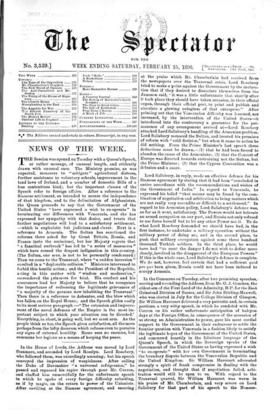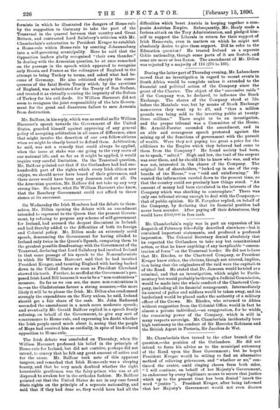In the Commons on Tuesday, after two promising speeches, moving
and seconding the Address, from Mr. G. J. Goscben, the eldest son of the First Lord of the Admiralty, M.P. for the East Grinstead Division of Sussex, and Sir John Stirling-Maxwell, who was elected in July for the College Division of Glasgow, Sir William Harcourt delivered a very patriotic and, in certain portions, a very witty speech, in which he condoled with Mr. Curzon on his rather unfortunate anticipation of halcyon days at the Foreign Office, in consequence of the accession of so strong an Administration to power, gave his most cordial support to the Government in their endeavour to settle the frontier question with Venezuela in a fashion likely to satisfy the legitimate hopes of the Government of the United States, and concurred heartily in the felicitous language of the Queen's Speech, in which the Sovereign speaks of the Government of the United States as having expressed a wish "to co-operate" with her own Government in terminating the boundary dispute between the Venezuelan Republic and the United Kingdom. Sir William Harcourt advocated strongly a spirit of frank compromise in dealing with the negotiation, and thought that if negotiation failed, arbi- tration would still be open to us. With regard to the Transvaal quarrel, Sir William Harcourt was warm in his praise of Mr. Chamberlain, and very severe on Lord Salisbury for that part of his speech to the Noncom-
formists in which he illustrated the dangers of Home-rule by the suggestion to Germany to take the part of the Transvaal in the quarrel between that country and Great Britain, and contrasted Lord Salisbury's criticism with Mr. Chamberlain's exhortation to President Kruger to establish a Home-rule within Home-rule by erecting Johannesburg into a self-governing municipality. Here he said that the Opposition leaders gladly recognised "their own thunder." In dealing with the Armenian question, he at once remarked on the passage in the speech which appeared to recognise only Russia and France as the colleagues of England in the attempt to bring Turkey to terms, and asked what had be- come of Germany. He also criticised sharply the conse- quences of the fatal Berlin Treaty which, by the exertions of England, was substituted for the Treaty of San Stefano, and treated it as virtually securing the impunity of the Sultan of Turkey for his evil deeds. Sir William Harcourt did not seem to recognise the joint responsibility of the late Govern- ment for the great and disastrous failure to save Armenia from destruction.



































 Previous page
Previous page